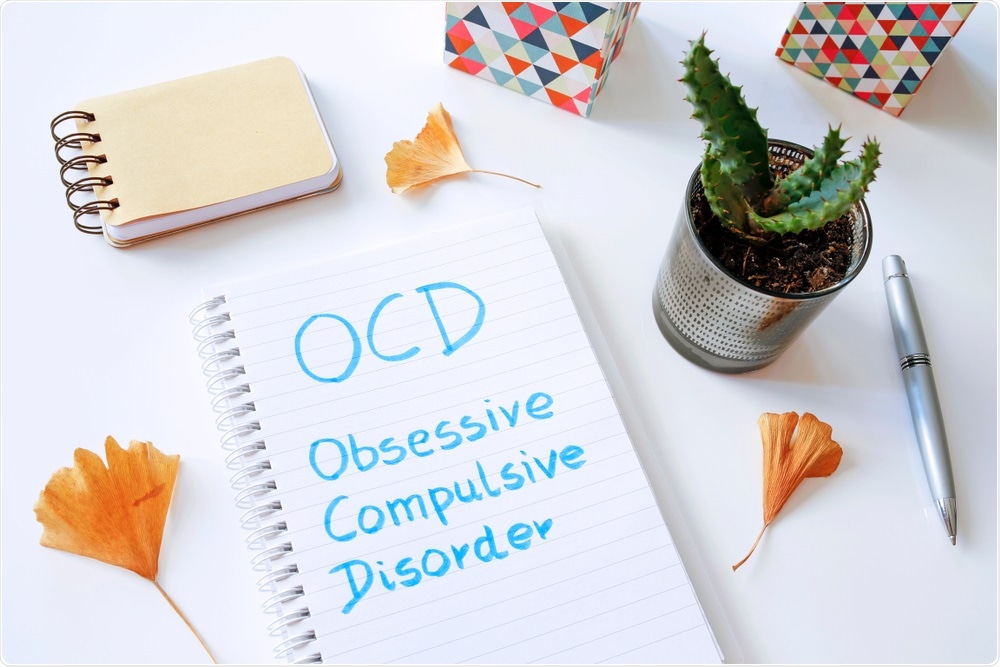For the first time, scientists have linked distinct patterns of genetic mutations with obsessive-compulsive disorder (OCD) in humans using genome-wide analysis.

OCD. Image Credit: chrupka/Shutterstock.com
Strengthening the genetic associations to neurodegenerative diseases
Neurological diseases are prevalent among an increasingly aging population and the progress of molecular techniques may help the identification, diagnosis, and treatment of such diseases. One such condition of particular concern and interest for research is OCD.
OCD causes uncontrollable, recurring thought patterns and behaviors that interfere with patients' daily lives. "OCD is a disabling disorder that is twice as common as schizophrenia," says H. Blair Simpson, MD, Ph.D., professor of psychiatry at Columbia University Vagelos College of Physicians and Surgeons and director of the Center for OCD & Related Disorders at New York State Psychiatric Institute. As a condition, OCD affects 1 to 2% of the world’s population and is often a hereditary condition. However, many of the genes related to OCD remain undiscovered.
In a new study published in the journal Nature Neuroscience, researchers from Columbia University Vagelos College of Physicians and Surgeons and several other institutions have successfully associated distinct patterns of genetic mutations with obsessive-compulsive disorder (OCD) in humans.
Previously, studies have mainly used a "candidate gene" approach to study the genetics of OCD. Although this allows researchers to focus on potential candidate genes that might be involved in pathogenesis, this approach can lead to challenges in statistical interpretation and can fail to identify unexpected genes.
Funding agencies and the pharmaceutical industry have therefore adopted a genome-wide analytical approach instead of gene targeting to identify the genes affecting disease risk more accurately.
Many neurological diseases are influenced by strongly acting mutations which can cause disease by themselves. These mutations are individually very rare but important to find because they can provide a starting point for the development of therapeutics that target precise underlying causes of disease.
Although strongly acting mutations have been hypothesized to exist in OCD, statistically reliable evidence has been difficult to obtain the solution to the problem is to study all the genes in the genome at the same time and ask whether any of them have significant evidence of influencing risk. That had not been done yet at scale in OCD".
David Goldstein, Ph.D., Director of the Institute for Genomic Medicine at Columbia University
OCD associated with mutations in specific genes including SLITRK5
The multi-institution collaboration led by Goldstein’s team that conducted this work included scientists from the University of North Carolina at Chapel Hill, the David Geen School of Medicine in Los Angeles, Harvard Medical School, and SUNY Downstate Medical Center in Brooklyn.
Goldstein’s team used the genome-wide approach utilizing high-throughput sequencing and computational biology techniques on data obtained from a cohort of patients known to suffer from OCD obtained from Gerald Nestadt, MBBCh, a psychiatrist at Johns Hopkins University.
This method allowed researchers to identify relevant genes anywhere in the genome among the 1,300 OCD patients, which was then compared to data from similarly large control groups.
Analysis across treatment and control groups showed strong correlations between OCD and specific rare mutations. This was observed in genes such as SLITRK5, which had been previously linked to OCD in candidate-gene studies.
Slitrk genes are composed of six members (Slitrk1 - Slitrk6) expressed in the central nervous system and were previously found in mice to be associated with neural tube defects and the development of neuropsychiatric conditions. This study, however, is the first to demonstrate that it is only one of many genes involved in OCD, as revealed using whole-genome sequencing.
New opportunities supporting effective gene therapies
The findings of the present study confirm the validity of targeting specific genes to develop new gene-based treatments for neurodegenerative diseases such as OCD. Additionally, this study also identified a specific pattern of variation in other genes that can encourage pharmaceutical companies and translational researchers to develop drugs addressing these patterns of expression across specific genes.
Goldstein states that, "When you look at genes that do not tolerate variation in the human population, those are the genes most likely to cause disease, and with OCD, we see an overall increased burden of damaging mutations in those genes compared to controls," adding that, "That's telling us that there are more OCD genes to be found and where to find them."
However, OCD treatments are often slow to be developed. Currently, only 2 treatments are available. One is a serotonin reuptake inhibiting drug and the other is based on cognitive-behavioral therapy, both of which are highly effective but only work on about half of patients.
Therefore, more general treatments need to be developed for the whole range of patients suffering from OCD and this study provides grounds to expand research and treatments towards genetic mutations as well. Indeed, Prof. H. Blair Simpson that was not involved in this study states, "these genetic findings are very exciting; they indicate that the promise of precision medicine could include OCD, ultimately transforming how we diagnose and treat this disorder."
Journal reference:
- Mathew Halvorsen, Jack Samuels, Ying Wang, Benjamin D. Greenberg, Abby J. Fyer, James T. McCracken, Daniel A. Geller, James A. Knowles, Anthony W. Zoghbi, Tess D. Pottinger, Marco A. Grados, Mark A. Riddle, O. Joseph Bienvenu, Paul S. Nestadt, Janice Krasnow, Fernando S. Goes, Brion Maher, Gerald Nestadt, David B. Goldstein. Exome sequencing in obsessive-compulsive disorder reveals a burden of rare damaging coding variants. Nature Neuroscience, 2021; DOI: 10.1038/s41593-021-00876-8